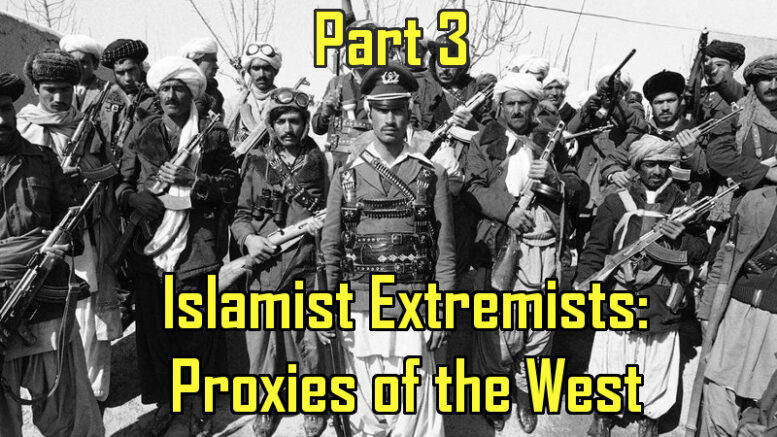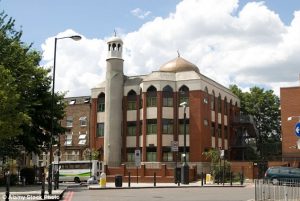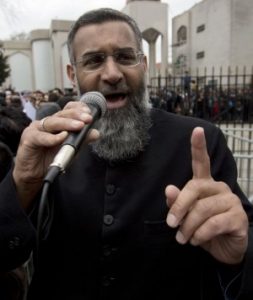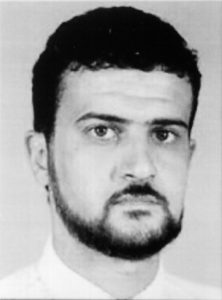From the mid 1990’s onward numerous terrorist organisations and leading terrorists were given a home in the UK. The evidence clearly shows that this was the result of a deliberate policy of the UK government. It has been suggested that this was a form of appeasement aimed at ‘reducing’ attacks on the the British mainland and an intelligence led operation to keep close tabs on potential threats. However, it is also clear that the policy effectively provided safe harbour from prosecution for known terrorists and a center for the recruitment operations of terrorist organisations. In Part 1 we looked at the historical background of the West’s support for Islamist extremists and in Part 2 the significant role the CIA (among others) played in the creation of al Qaeda. We will now explore how the UK became the European center of operations for Islamist extremists.
Al Muhajiroun was instrumental in the radicalisation of young British Muslims and their passage to training camps and conflict in Central Asia, the Middle East and the Balkans. It seems likely that many would have attended the training camps established by known CIA assets like Junaid Barbar, who was an al Muhajiroun member and frequent visitor to their offices in the UK. Both Omar Khyam, the supposed fertiliser bomb plot leader, and Sidique Khan, the 7/7 ringleader, were members, as were most of their fellow plotters.
In 1983 ‘Jamaat Al Muhajiroun’ was formed by Omar Bakri Muhammad, a Syrian borne exile living in Saudi Arabia. In 1985 Bakri was expelled from the Kingdom and came to the UK, where he was given political asylum. He immediately began promoting the Islamist ideology of Hizb ut-Tahrir. However, unlike that organisation, which was largely an Islamist ‘think tank’ promoting the creation of an Islamic Caliphate, Bakri’s radicalising calls to violence apparently lost him favour, resulting in his expulsion. Consequently, together with British borne Anjim Choudary, in 1996, Bakri started to set up the Al Muhajiroun network in the UK. Which does beg the question, though clearly not for everyone, why known Islamist extremists were able to gain asylum in the UK with the agreement of the British government.
It wasn’t just the Fertiliser bomb plotters and the 7/7 bombers who were closely linked to Al Muhajiroun. The killers of off duty soldier Lee Rigby, Michael ‘Mujahid’ Adebolajo and Michael Adebowale, also had ties. As did failed ‘shoe bomber’ Richard Reid and London Bridge attacker Khuram Butt. Just like the leaders of both the 9/11 and 7/7 plots, all were well-known to the security services and intelligence agencies, prior to launching their attacks. Though we should also remember how many attacks they do protect us from even if subsequent convictions are a bit thin on the ground.
Bakri was an informant working with MI5. Just before 7/7, Pulitzer prize winning journalist Ron Suskind conducted a series of interviews with Bakri. Suskind claimed that an official source within MI5 had told him that Bakri had helped MI5 on several of its investigations. Reportedly, when Suskind asked Bakri about his links to MI5, and why he had worked with them, he said:
“I’m upset you know this…..I like it here, my family’s here. I like the health benefits.”
Regardless of Suskind’s stature as a journalist, the citing of unnamed sources isn’t, in itself, evidence of much. However, Bakri’s further comments and both his and Al Muhajiroun’s remarkable evasion of British justice, only start to make any sense in light of the ‘strategy of tension.‘
In 1990 Bakri, while living in the UK, openly called for the assassination of the British Prime Minister John Major. Bakri said:
“[Major is….] a legitimate target; if anyone gets the opportunity to assassinate him, I don’t think they should save it. It is our Islamic duty and we will celebrate his death.”
In one of the many incidences of his amazing ability to avoid prosecution Bakri was arrested for ‘interview’ but wasn’t charged. If you or I publicly made such statements we would rightly be prosecuted under legislation such as the Offences Against the Person Act 1861. We would also probably face charges of Sedition and possibly Treason. Yet Bakri, radical Islamist and founder of extremist terrorist organisations linked to al Qaeda, wasn’t.
In 2004 Bakri stated in an interview:
“I believe Britain is harbouring most of the Islamic opposition leaders of the Muslim world.… Because the British elites are very clever, they are not stupid like the Americans. Remember these people used to rule half of the world.… The British are not like the French and the Germans, they don’t slap you in the face, they stab you in the back. They want to buy some of these Islamic groups….. I believe the really clever people are the elites in this country, as they know how to divide Muslims.”
Not only was Al Muhajiroun the centre of an Islamist extremist recruitment operation, but it also set up Sharia Courts in the UK (though they lacked any legal standing). This enabled Bakri to receive a fee and raise funds for Al Muhajiroun in return for voluntary ‘arbitration services.’ Bakri was also a close associate of al Qaeda facilitator and recruiter Mohammad Quayum Khan (also known as ‘Q’). Yet despite all of this, in the knowledge the supposed 7/7 bombers were members of his organisation, following the London Bombings, Bakri was allowed to leave the UK for Lebanon. On the day of his departure the MSM stalwart, the Sunday Times, printed a story quoting Bakri, as he heaped praise upon the alleged London bombers, calling them the “Fantastic Four.”
A year later the UK government announced that Bakri would not be allowed to return. This left Bakri free to continue to inspire his Al Muhajiroun followers as he was also seemingly impervious to prosecution by the Lebanese authorities. Like the British they arrested him but then decided to let him go. In 2007 Bakri stated:
“We were able to control the Muslim youth.… The radical preacher that allows a venting of a point of view is preventing violence. Now, many of us are gone or in jail, and we’ve been replaced by radical jihadis, who take the youth underground. You don’t see them until the day they vent with the bombs.”
This seemed to corroborate the earlier statement by French Government counter-terrorism advisor Roland Jacquard who said:
“……every al Qaeda operative recently arrested or identified in Europe had come into contact with Bakri at some time or other.”
Another vocal proponent of Al Muhajiroun’s ideology was its co-founder Anjem Choudary. Both Bakri and Choudary achieved notoriety in Britain and were frequently seen and heard in the British media. For example, following the Woolwich attack on Lee Rigby, Choudary was wheeled out on BBC’s Newsnight where he absolutely refused to condemn the murder. Thereby stoking resentment to boiling point at a time when a shocked British public were already overwhelmed by the seemingly unbelievable events. This was yet another Choudary performance which was carefully crafted to avoid any direct calls for violence, thus avoiding prosecution. The effect of his numerous media appearances, over a 20-year period, prior to his eventual conviction in 2016, seemed to simultaneously reinforce the ‘us vs them’ narrative, and promote the concept of ‘blowback.’
‘Blowback,’ latterly a subject for much discussion in the MSM, suggests that domestic terrorism is inspired by a reaction against the perceived persecution and unjustified killing of Muslims abroad. The argument goes that angered by ‘fake news,’ and invigorated by extremist ‘social media’ content, young indigenous Western Muslims (predominantly men) are made susceptible to radicalisation by extremists and hate preachers. For most this seems feasible, an unavoidable consequence of the ‘war on terror.’ It is certainly as far as anyone in the Western establishment is willing to go when considering our own responsibilities.
Yet it also provides a fall back position of ‘plausible deniability’ whenever evidence of intelligence and security agency involvement with Islamist extremists emerges. Rather than suggesting the possible, deliberate use of a ‘Gladio B‘ strategy, it can be seen simply as the unforeseeable consequence of efforts to combat the scourge of terrorism. Blowback infers the entire ‘war on terror’ is escalating, spiralling out of control. It suggests the likelihood of further terror coming to our shores. This therefore means the ‘military industrial intelligence complex’ needs a lot more money to ‘keep us safe.’ It adds to the public’s sense of fear and pleas for protection from the state. It also weaves its way perfectly into ‘radicalisation’ narrative, increasing public anxiety about ‘social media’ inspired terrorists. This then promotes blithe acceptance of the need to further curtail freedom of speech.
In reality, when we look at who the domestic terrorists are, the single common denominator appears to be that they are all well-known to the security and intelligence services, who always need more resources to fight them. The concept of ‘blowback’ allows the MSM to present simplistic explanations about why we face a terrorist threat, as opposed to offering any genuine, rational exploration of the geopolitical forces at play, or the historical context.
The leaders of Al Muhajiroun’s offices in the notorious Brixton and Finsbury Park Mosques in London were also reportedly connected to British intelligence. Abu Hamza worked with ‘retired’ military personnel, contracted through the Defence Intelligence Agency and MI6, to run terrorist training camps in Wales. The recruits were then apparently dispatched to fight in Kosovo. Abu Qatada, who was a known European al Qaeda facilitator, was also reported to have been an MI5 double agent.
Al Muhajiroun itself was impervious to court decisions for many years. Despite being prescribed as a terrorist organisation under the Terrorism Act 2000, and subsequent banning orders, its leaders just changed the name whenever necessary. A tactic used consistently by terrorist groups fighting in Syria today. The names seemingly mean little, it’s the objective that counts. These reincarnations included ‘Islam4UK,’ ‘Need4Khilafah,’ the ‘Shariah Project,’ and ‘the Islamic Dawah Association.’ This tactic enabled it to continue operations with relative ease until 2014.
Members of Al Muhajiroun weren’t the only radical Islamist to receive asylum in the UK either. Others included members of the Libyan Islamic Fighting Group (LIFG), also known as Al-Muqatila, who set up homes in Britain. Many settled in major UK cities such as Birmingham, Manchester and London. Is it reasonable to ask why these individuals and groups were consistently allowed to do so when their Islamist extremism was well-known? Following 9/11, the LIFG were listed by the U.N Security Council as a prescribed terrorist organisation. Patrick O’Brien, the U.S. Treasury’s Assistant Secretary for Terrorist Financing and Financial Crime said:
“The Libyan Islamic Fighting Group threatens global safety and stability through the use of violence and its ideological alliance with al Qaeda and other brutal terrorist organisations.”
Which is all a very odd because shortly after 9/11 Libyan Head of Intelligence Musa Kusa personally took a list of LIFG terrorists, known to be living in London, and shared it with the British. However, they didn’t apprehend or question any of them. Perhaps some explanation can be found in the evidence which supports the allegation that members of the LIFG were employed by MI6 in a failed assassination attempt upon Libyan dictator Muammar Gaddafi in 1996. There is no doubt that LIFG members were involved in the attempt. The LIFG used the soon to be familiar al Qaeda tactic of placing a roadside bomb (Improvised Explosive Device – IED) ahead of Gaddafi’s motorcade. They targeted the wrong vehicle and Gaddafi escaped, but in the ensuing gun battle known LIFG terrorists were killed.
One of those LIFG members was Ramadan Abedi. He fled to the safety of the UK in 1993 remaining until his eventual return to his Libyan homeland in 2008. In 2011 the British and French militaries provided air support for groups, including the LIFG, who violently overthrew and brutally executed the tyrant Gaddafi. Consequently, the country rapidly broke apart, becoming a failed state, and both a centre for the training of Islamist extremists and a main staging post for human trafficking into Western Europe.
Ramadan’s son, Salman Abedi, who grew up in the Islamist extremist Al-Muqatila community in Manchester, was allegedly the suicide bomber who killed 22 people in the Manchester Arena Bombing in 2017. We await the outcome of the inquiry into the atrocity to discover more about how he became ‘radicalised’ and developed the knowledge and expertise to build the explosive device he allegedly used. Many of the initial MSM reports have suggested he achieved this after watching a few YouTube videos. Again, increasing calls for more government control of the internet. One wonders if the fact that Salman Abedi lived a few minutes walk away from the notorious master bomb maker Abd al Baset Azzouz, who lived in Wilbraham Road in Manchester, was investigated or if it will be explored by the inquiry.
Journalist and author Dan Glazebrook strongly expressed the view that the British government were culpable for creating an environment which effectively facilitated the Manchester bombing. (see video below)

Another prominent member of the tightly-knit Libyan Islamic Fighting Group community was Anas al Liby. According to the U.S. department of Homeland Security, during the 1990s Anas al Liby travelled throughout East Africa in the company of Ali Mohamed. The pair were scouting targets for Mohamed’s associate Osama bin Laden. They apparently identified the U.S. embassies in Nairobi, and the former Tanzanian capital Dar es Salaam, as targets. This led to their bombings in 1998 under the direction of bin Laden. Two hundred and twenty-four people were murdered and thousands wounded in a series of coordinated attacks. Following the murder of two German intelligence officers (husband and wife Silvan and Vera Becker) by LIFG terrorists in Libya in 1994, the Libyan government became the first to issue and international arrest warrant for Osama bin Laden. However, MI6 protested the Interpol issued warrant.
Anas al Liby lived in the UK and continued to support the LIFG until a raid on his home in 2000. The raid uncovered an ‘important’ al Qaeda training manual, which came to be known as the ‘Manchester Manual.’ However, al Liby himself was apparently expecting visitors and evaded capture. Following 9/11 he was immediately placed on the FBI’s most wanted list and a $5M reward was offered for information leading to his capture. It stated that he was wanted in connection with the 1998 U.S. embassy bombings and that he had been living in England. Seeing as he had been wanted by the FBI since at least 1998, it seems unfortunate they didn’t know he had settled in Manchester, only finding out after he’d already left the country. What’s even more unfortunate is that in 1999 the British arrested him but didn’t charge him and, despite the fact he was wanted by the FBI, let him go.
Another prominent Islamist extremist residing in the UK was Abu Qatada who was a member of the al Qaeda ruling council (Fatwa.) He was certainly an informant and a probably an MI5 agent or at least an asset. He had frequent meetings with MI5 officials and openly declared his opposition to Osama bin Laden, telling them he would inform upon anyone ‘damaging British interests.’ An MI5 agent recorded:
“….surprisingly enough—[Abu Qatada] revealed little love of the methodology and policies pursued by Osama bin Laden. He certainly left me with the impression that he had nothing but contempt for bin Laden’s distant financing of the jihad.”
Therefore, it isn’t entirely surprising that only hours before UK anti terror legislation came into effect, which would have necessitated his arrest, he escaped surveillance. In December 2001, Abu Qatada went into hiding with his pregnant wife and four children. At the time he had been sentenced to death ‘in absentia’ by the Jordanians and was wanted in connection with al Qaeda terrorist attacks by a number of other countries, including the U.S, Spain and France. The British strongly disavowed any suggestion they had hidden him to avoid any ‘awkward’ trials, despite the fact that he was supposedly under close monitoring when he escaped. However, some within French intelligence maintained he was and agent for MI5.
He was eventually apprehended by Scotland Yard in October 2002 after coming out of ‘hiding’ to release a radical justification for the 9/11 attack entitled ‘The Legal Vision for the September 11 Events.’ This proved to be a highly effective piece of propaganda. Contrary to his previously stated opinion, he praised Osama bin Laden, enhancing the mythology surrounding him, drawing yet more to Islamist extremism.
He was eventually arrested, living with his family in his London home, before being placed in Belmarsh high security prison for more than 10 years without charge. In 2013 Qatada was finally deported from the UK to Jordan who cleared him of all terrorist charges and released him, having reversed the death penalty he received earlier. The then UK home Secretary Theresa May reassured the British public that he would not be allowed to return to the UK. The British government had fought a lengthy legal battle to force his Jordanian trial, effectively avoiding his extradition for trial anywhere else.
As we have discussed here and in Part 1 and 2 of this series the evidence that elements within the Western intelligence, military and political establishment have been intimately involved with Islamist extremists organisations for decades, including ISIS, is overwhelming. However to truly grasp the depth of this involvement we need look no further than the amazing story of Ali Mohamed. Which is precisely what we will do in Part 4.












Be the first to comment on "Islamist Extremists – Proxies of the West – Part 3"